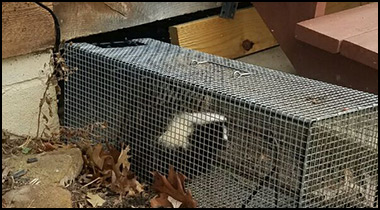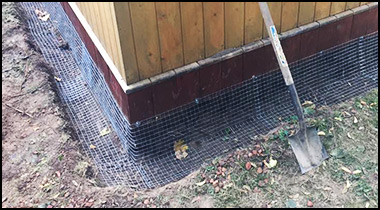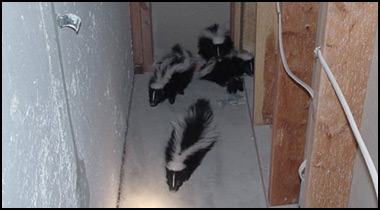Macon Skunk Removal Resources
Skunk Rehabber - Awl Wildlife Specialist: (678) 762-1051
Free Bibb County Animal Services: (478) 751-9200
Humane Wildlife Trappers of Macon: 478-488-3003
If you need skunk control in Macon, you have a few options. First, you can attempt to solve the skunk problem yourself by reading our do-it-yourself guide. If you need outside help, you can also call Bibb County Animal Services to see if they have any free resources or help for you - however, they primarily deal with dog and cat concerns. You can also call a local Macon wildlife rehabber, as they are typically a great resource for advice that is in the best welfare of the animal. If as a last resort you must hire a professional company, we recommend Humane Wildlife Trappers of Macon at 478-488-3003. To learn more about them or check their skunk removal prices, visit maconpestanimal.com.

Macon Skunk Trapping and Removal

Preventative Repairs & Exclusion

Macon Skunk Removal From Structures
In many cases, preventative measures can solve your Macon skunk problem - keep garbage secured, pet food indoors, and most of all when it comes to skunks, secure the perimeter of your shed, porch, deck, or house with a barrier - lattice or steel mesh is good, and it keeps Georgia skunks from going under the structure. If trapping and removal of the skunk is the only option you have, please do so with the help of a local agency or professional company who knows how to do it humanely and legally. Browse the resources of this site for more educational information.
Frequently Asked Questions:
Prevention: How to Keep Skunks Away
What to do with a skunk after I catch it?
Is it legal for me to trap a skunk?
How to remove skunk odor
Is a skunk active during the daytime rabid?
What does skunk feces look like?
Macon Skunk Control Information: Do Skunks Shed their Fur?
The shedding of and how much a skunk will shed are largely dependent on the location that the skunk resides in. Even with this in mind there are skunks that do not shed at all or skunks that only shed at the tip of their tails.
Seasonal shedding will occur twice a year. In the spring a skunk will loose its course undercoat that was once needed to keep them warm. They will then grow a coat that is very soft. As the fall approaches the undercoat will again appear.
A skunks shedding of fur is not as plentiful as a cats shedding would be. It is noticeable should your skunk be a pet. You will most likely notice the shedding appearing as one or two balls of fur.
With a pet skunk there are a few things that one should look for during shedding season. A skunk which is over a year old should have had experienced shedding, even if only the tail. If your pet has not had shedding in the past, a prudent move would be to visit a vet.
Sometimes a pet skunk may not shed due to its diet. A healthy diet of proteins, fats, and good/green vegetables will fix the problem. In other cases a skunk may shed and the hair may not grow back, a vets assistance is needed in this case. If the area in which the shedding has occurred is broken, the vet will have to do a culture and the correct medication will have to be provided.
Skunk wounds have the proclivity to appear to be healed on the surface, however under the surface there could very well be a severe infection. It is for this reason as well a vet should be called.
If you find that you skunk does not have any form of infection and the diet is as it should be, the use of zinc would be the next step. Zinc can be found in nuts such as almonds. However, you can also find it in a child's vitamin supplement. Supplying the Zinc will last for several weeks, at 3-5 mgs. per day, for 5 days a week. Discontinue and the hair should grow in rather quickly.
Giving your skunk zinc supplements is effective. However, it is much better to have any and all required supplements received through their diet instead
Remember, for free services you can try (678) 762-1051 or (478) 751-9200, but if you need to pay for professional help, check the prices at the maconpestanimal.com website. Or follow our do-it-yourself guide!

